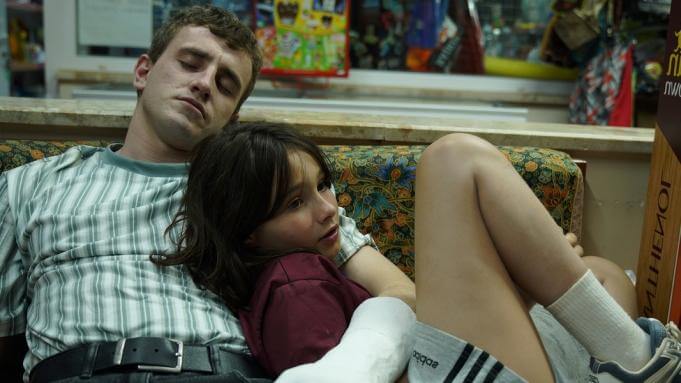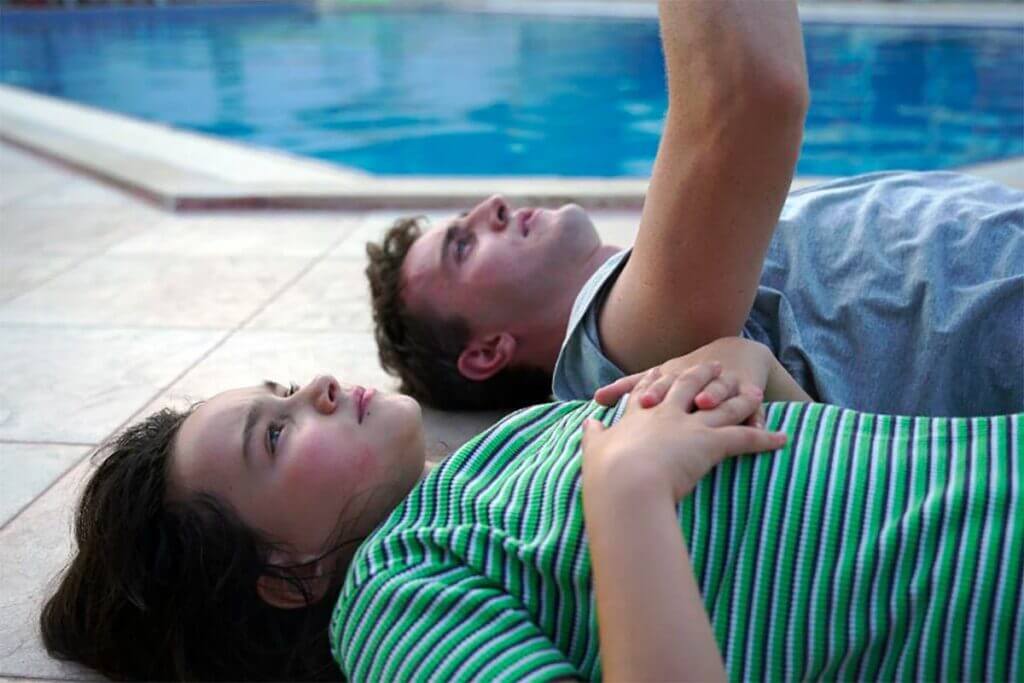From unknown and untalked about to one of the hot tickets at Cannes, Aftersun follows young father, Calum, and his 11 year old daughter, Sophie, as they go on vacation to a resort in Turkey. Taking a page from David Foster Wallace, director Charlotte Wells plays on the stress of the structured, luxury vacation, where the pressure to have fun and constantly enjoy oneself is in tension with any feelings of dissatisfaction that pop up. Aftersun is framed as a series of memories about the trip from a now-older Sophie, who makes sporadic appearances throughout the movie. We learn she is married and has a child of her own, but otherwise she remains mostly obscure. There’s no dialogue explaining why she’s troubled by the memory of this particular trip, and the movie often does this: subtly suggesting things instead of stating them outright. Calum has a broken wrist, for example, and though there’s a brief mention of a fall, the lack of clarity about what happened creates space for mystery, and hints at instability never explicitly addressed.
The movie moves at a loose and leisurely pace. The choice to break up the scenes in the resort with future, impressionistic scenes in a nightclub disrupts the sense of containment and linear-movement. There isn’t too much conventional plotting, but the movie never feels baggy or lacking in energy. It chugs along as Calum and Sophie go for a day trip to local mud-baths, go snorkeling, or take a quiet day by the pool, while sources of tension push in at the periphery. Wells doesn’t go for just the obvious sources of tension, like Calum’s money troubles or his ex-wife, either. There are scenes in which Calum and Sophie are at odds with each other for seemingly no reason, the stand-out being a karaoke scene in which Calum doesn’t feel like joining in a duet of “Losing my Religion,” leaving Sophie to sing (painfully out of tune) for a crowd of uninterested people. The movie is not afraid to confront the ambiguity of emotion, the volatility and seeming randomness of people’s feelings, as Calum goes from feeling insecure to stubborn, to enraged, and later, regretful.
People interested in queer cinema will have lots to chew on with Aftersun, which portrays (without us realizing it at first) the early formation of a child’s gay identity. The sensualness often associated with queer cinema can be found in the camerawork here, which is intimate with the characters’ bodies, giving us extended shots of them breathing heavily while asleep, or rubbing mud on their necks and each other’s backs. There are moments of intense closeness, as in one scene when Sophie is playing an arcade game with a boy and the hair on their forearms brushes against each other, and moments of heightened loneliness, as in the aforementioned karaoke scene. Wells chooses to shoot that scene focusing almost entirely on Sophie, only once cutting away to show us the mixed reactions of the other people in the crowd. Unlike another Cannes film from this year, Cronenberg’s Crimes of the Future, the camera feels very close to the two main characters, rarely moving away to occupy an outside perspective, or one removed from the senses and impressions of the two protagonists.

Aftersun becomes a movie about the way family members shape each other. Calum takes Sophie to a rug shop in the city, an activity she apparently takes little interest in at the time. But in the future, in adult-Sophie’s apartment, Wells slips in the detail that she has bought and kept an oriental rug for her bedroom. The movie is an enthralling portrait of a father trying his best (and struggling) to relate to his daughter, and a young girl entering adolescence, learning how to be independent and a little less afraid of others.
